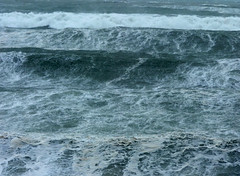 The danger for a novelist in finding repeated success lies in the increased probability that readers will eventually get wise to his formula. The more distinctive the style, the greater the danger, and few modern fantasists are as distinctive as Neil Gaiman. His mystical stories often feature young protagonists traipsing into faerie (Stardust), being raised by dead people (The Graveyard Book), and finding their mothers replaced by an unnamable horrors bent on their destruction (Coraline). I've generally enjoyed Gaiman, but I have to admit that descriptions of his latest book, The Ocean at the End of the Lane, made it seem somewhat lacking: A boy living in the British countryside discovers that his mysterious neighbors, the Hempstock women, have access to a world beneath the world. Okay, nothing new so far. But Gaiman keeps things fresh in an unexpected way: For the first third or so of the book, his trademark fantasy barely gets a nod.
The danger for a novelist in finding repeated success lies in the increased probability that readers will eventually get wise to his formula. The more distinctive the style, the greater the danger, and few modern fantasists are as distinctive as Neil Gaiman. His mystical stories often feature young protagonists traipsing into faerie (Stardust), being raised by dead people (The Graveyard Book), and finding their mothers replaced by an unnamable horrors bent on their destruction (Coraline). I've generally enjoyed Gaiman, but I have to admit that descriptions of his latest book, The Ocean at the End of the Lane, made it seem somewhat lacking: A boy living in the British countryside discovers that his mysterious neighbors, the Hempstock women, have access to a world beneath the world. Okay, nothing new so far. But Gaiman keeps things fresh in an unexpected way: For the first third or so of the book, his trademark fantasy barely gets a nod.How to explain the way in which The Ocean at the End of the Lane unfolds? Frankly, it reads a lot like Ray Bradbury. Gaiman spends a ton of time on the texture of the unnamed narrator's childhood, a narrator one suspects has quite a lot in common with Gaiman himself. You know how Bradbury liked to go on and on about apple pie and carnivals and the delights of Midwestern summers? Well, Gaiman does much the same here, but instead of zeroing in on youthful joys, the book focuses on its small sorrows. The death of a favorite cat. A father's inability to make toast without burning it. Never quite fitting in and fearing you never will. The narrator's only constant comfort seems to be books. "I liked myths," he says. "They weren't adult stories, and they weren't children's stories. They were better than that. They just were. Adult stories never made sense. They were so slow to start. They made me feel like there were secrets, Masonic, mythic secrets, to adulthood. Why didn’t adults want to read about Narnia, about secret islands and smugglers and dangerous fairies?" The effect isn't a straight draught of sadness, but a subtle, permeating melancholic tincture.
Well, at least until a housekeeper named Ursula Monkton -- who is not at all what she appears to be -- shows up. Then it becomes an adult version of Gaiman's own Coraline, a version tinged with cosmic horror. You'll notice that I haven't described much of the plot, because a lot of the joy of reading Ocean comes from discovery. Suffice it to say that Lovecraft's peculiar blend of science fiction and terror pops up more than once, with creatures from the beyond the veil of space and time shredding the thin barrier that separates our plane of existence from theirs. But those aren't the scariest parts. No, Gaiman reserves the real horror for the misunderstood clutch of adult bodies spied through parted drapes, for the strength of a father's hands that reach out in anger rather than love. Amongst the cosmos-spanning revelations, the book keeps drawing us back to little pains and tiny joys, the stuff of universal human experience. It's a masterstroke to meld the miraculous with the mundane, and for that The Ocean at the End of the Lane deserves attention.
(Picture: CC 2014 by Graham Richardson)


No comments:
Post a Comment